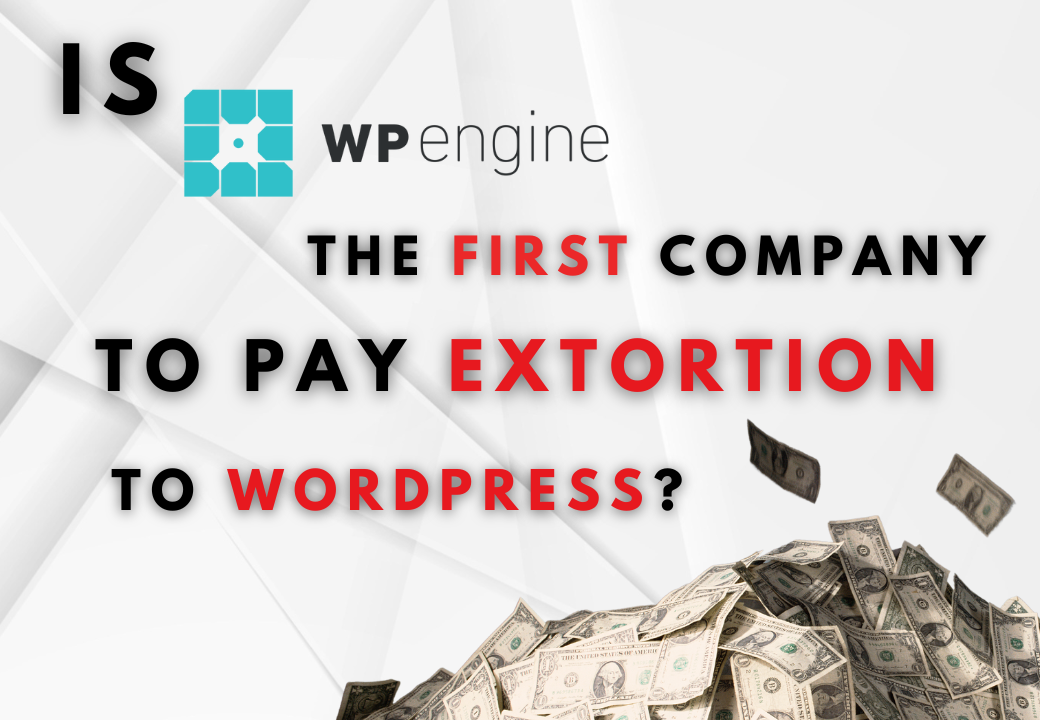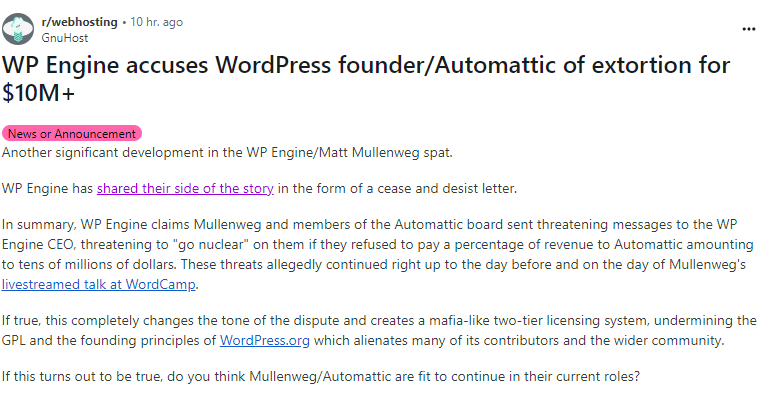It looks like a new chapter has opened in the WordPress ecosystem, and it’s not about innovation or community support. WP Engine, one of the largest WordPress hosting companies, is being pressured by Automattic, the company behind WordPress, to pay what looks like extortion money. Automattic, led by Matt Mullenweg, is demanding millions of dollars from WP Engine, threatening to harm their reputation if they don’t comply. This situation could be the first of many where Automattic forces companies to hand over a share of their revenue just for existing in the WordPress space.
The extortion allegation
According to a cease-and-desist letter sent by WP Engine’s legal team to Automattic, the CEO of Automattic, Matt Mullenweg, made unprecedented demands in the days leading up to the WordCamp US 2024 conference. Mullenweg allegedly threatened WP Engine with what he called a “scorched earth nuclear approach” unless WP Engine agreed to pay “tens of millions of dollars” to Automattic. The letter claims these payments were presented as a way to maintain peace between the two companies, but in reality, it appears to be an attempt to extract significant revenue from WP Engine.
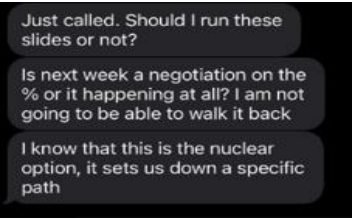
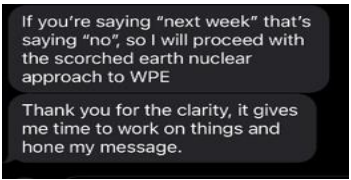

In parallel and throughout September 19 and 20, Mr. Mullenweg embarked on a series of harassing text messages and calls to WP Engine’s board member and also its CEO
The document outlines how Mullenweg, through both text messages and emails, put immense pressure on WP Engine’s executives, demanding an immediate financial response before his keynote address at WordCamp. In one of the messages, Mullenweg allegedly warned that he had already created slides for his keynote speech, taking aim at WP Engine and its investor, and would present them to WordCamp attendees – “We get a few thousand viewers on the livestream, and the videos on YouTube can get millions of views when we promote them,” implying that his speech could be used to damage WP Engine’s reputation if they didn’t comply.
This raises a serious question: Is this the start of a new business model for Automattic? Are companies that operate within the WordPress ecosystem now expected to pay a share of their revenue just to avoid public attacks?
Matt Mullenweg: open source champion or opportunist?
Mullenweg has long been considered a leader and protector of the open-source philosophy that drives WordPress. However, this situation paints a very different picture of a man who, according to WP Engine, is using his position to extort money from competitors. The letter sent by WP Engine’s attorneys describes Mullenweg’s demands as “disgraceful” and his actions as an “unethical abuse of power.” The document goes on to state:
“Mr. Mullenweg’s covert demand that WP Engine hand over tens of millions to his for-profit company Automattic, while publicly masquerading as an altruistic protector of the WordPress community, is disgraceful.”
This accusation touches on a deep-rooted issue in the WordPress ecosystem: the blurred lines between Automattic, a for-profit entity, and the WordPress Foundation, a non-profit organization that governs the WordPress project. Mullenweg holds leadership roles in both, and his actions in this case suggest that he may be using his influence within the Foundation to benefit Automattic financially.
The impact on the WordPress ecosystem
Before WP Engine’s statement appeared on reddit.com, which prompted comments suggesting that now, with both sides having had the chance to speak, the situation offers a fresh perspective, countering the narrative that only the large, “evil” hosting provider was to blame, WP Engine had been viewed as the corporate leech that merely profits from others.
The hosting community, along with WordPress users themselves, are starting to notice the ambiguities surrounding the WordPress Foundation and Automattic, as well as the blurred line between the use of the WordPress trademark and the influence on the functionality of WordPress installations provided by WP Engine.
Unfortunately WP Engine’s refusal to pay up has already led to what the company describes as a smear campaign by Mullenweg. During his keynote at WordCamp US 2024, Mullenweg reportedly made a series of false and disparaging statements about WP Engine. According to WP Engine, Mullenweg claimed that the company was simply trying to “feed off” the WordPress community without giving anything back. He went as far as encouraging WP Engine customers to not renew their contracts, stating that if they switched to a different host, they “might get faster performance.”
Indeed, some WP Engine customers and community members have already expressed an intention to stop doing business with WP Engine due to Mr. Mullenweg’s misconduct:
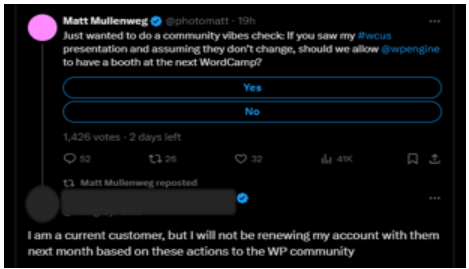
In the letter, WP Engine firmly denies these claims, highlighting its long-standing contributions to the WordPress ecosystem, including sponsoring WordCamps, supporting multiple open-source projects, and producing educational content for the community. The letter states:
“WP Engine has contributed tens of millions of dollars in ongoing support for the broader community through events, sponsorships, and the development of educational resources.”
The accusations of trademark misuse are also contested by WP Engine, which points out that their use of “WP” is explicitly allowed under the WordPress Foundation’s own trademark policy. This further underscores the inconsistency in Mullenweg’s actions—publicly accusing a company of violations that don’t exist, while privately pressuring them for money.
What does this mean for other hosting companies?
This situation has major implications for other businesses in the WordPress space. If Automattic is successful in extracting payments from WP Engine, what’s to stop them from targeting other companies? Plugin developers, theme creators, and other hosting providers could soon find themselves under similar pressure to hand over a share of their revenues to Automattic.
One of the most concerning aspects of this situation is the precedent it could set. WP Engine argues that Automattic’s actions threaten the entire WordPress ecosystem by undermining the principles of open-source collaboration. The letter points out that WP Engine is not the only company that could be impacted by this type of extortion. If Automattic starts demanding payments from other companies, it could lead to a situation where only those who can afford to pay survive, while smaller businesses are pushed out of the ecosystem.
“Mr. Mullenweg’s self-declared ‘nuclear war’ against WP Engine for daring not to capitulate to Automattic’s extortionate monetary demands has continued up through this writing,” the letter states.
What’s next?
It’s unclear how this situation will play out, but WP Engine has made it clear that it is prepared to fight back. The company’s letter demands that Automattic immediately cease its actions and preserve all relevant documents and communications for potential legal proceedings. WP Engine is not backing down, and the company is ready to defend its reputation and business relationships.
But the bigger question remains: What does this mean for the future of WordPress? Is Automattic positioning itself as a gatekeeper, demanding a revenue share from every company that relies on WordPress to run their business? If so, the open-source nature of the platform could be at risk.
Will WP Engine be the first company to pay extortion money to Automattic, or will they stand their ground and fight back? Either way, this is a pivotal moment for the future of WordPress.
